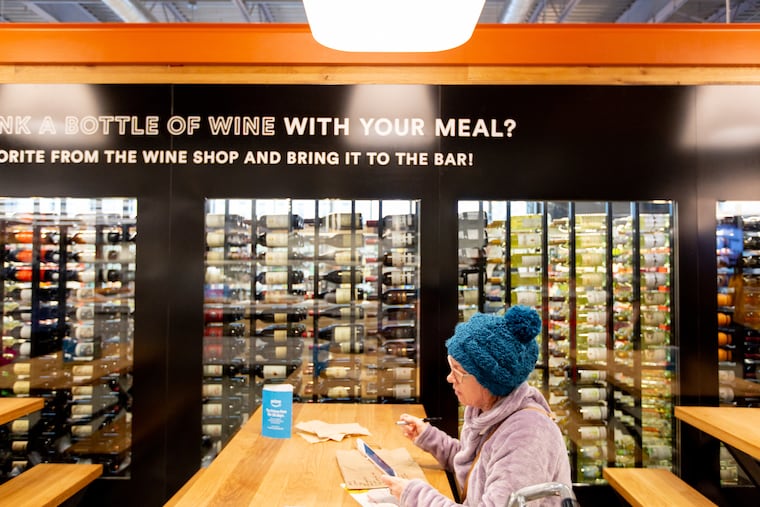Giant, Wegmans, and Acme have changed how we buy wine and beer in towns across Pa. | Maria Panaritis
A decade ago, Pennsylvania was the pits for easily buying wine and beer. Supermarkets have changed that. The Marple liquor vote helps show how.

The vote count on election day was so small that you could be forgiven for thinking this was a small-potatoes story.
But what happened Tuesday in Marple Township — a 2,357-to-1,303-vote rejection of its dry-town status — was so much more than a suburban Philly town doing away with the old-timey prohibition of alcohol sales in restaurants or supermarkets. It was, in fact, yet another in a string of victories in a war being fought in Pennsylvania over the last dozen or so years.
It’s a campaign being waged largely by supermarkets. An effort that has helped turn one of the nation’s most historically reactionary states in terms of alcohol into an East Coast leader in making it easier for residents buy booze.
I can barely believe I just wrote that last sentence. But it’s true — and we can thank supermarket companies for making it happen, if only out of their determination to remain competitive against one another.
In Marple, and with the muscle of the Giant supermarket chain behind the effort, residents this week approved a ballot question eliminating a nearly century-old ban on most retail alcohol sales in the Delaware County township. (So did voters in Lansdowne, and Aldan in Delaware County, and West Marlborough and Franklin Townships in Chester County.)
This is part of a strategy that supermarkets have been pushing to chip away at Pennsylvania’s notoriously forbidding liquor regulations and prohibitions. It used to be that the only place people could buy bottles of wine were in Liquor Control Board-run “State Stores” or what have been rebranded as kinder, gentler “Fine Wine & Good Spirits" stores.
But grocers began eating away at that status quo by setting aside enough in-store dining space to qualify for licenses as though they were restaurants. Then, they pushed for passage of a law that went into effect in 2016 — one allowing licensed grocery stores to sell up to four bottles of wine at once. In a battle also waged by convenience stores, six-packs of beer also made their way into supermarkets, a selling privilege formerly reserved almost exclusively for bars and taverns.
Just how huge a shift are we talking about?
A decade ago you couldn’t buy a bottle of burgundy in the same store as your broccoli. Or a six-pack. That huge.
Pennsylvania now is a leader in this regard compared with Maryland, New Jersey, Massachusetts, and Delaware, which have remained far more restrictive about whether grocery stores can sell alcohol, said Jeff Metzger, publisher of Food Trade News.
“These other states,” Metzger told me Wednesday, “haven’t moved.”
It all began about 12 years ago. That’s when Inquirer colleague Harold Brubaker reported that Wegmans and Acme were gunning for the ability to sell beer, wine, and spirits at their Pennsylvania stores. Rochester, N.Y.-based Wegmans planned to buy liquor licenses for the 11 stores it ran at the time in the Keystone State; Acme declared it a top regulatory issue for its company that year.
One by one, supermarkets began managing to sell alcohol in some form or another. A decade later, a bureaucratic chastity belt has been blown to bits: Today, even Target is selling alcohol after a recent renovation of its Plymouth Meeting store.
In Marple this week, it was the Giant supermarket chain, based in Carlisle, Pa., that pushed to secure the thousands of petition signatures needed just to allow the Delaware County township’s antiquated booze prohibitions to be voted on.
“Allows beer & wine sales in your GIANT," a flyer being distributed by a Giant employee at a polling place I visited on Tuesday afternoon proclaimed. “Increases customer convenience.”
Joe Rufo, a township commissioner for eight years now, said Giant’s involvement was key, considering that 3,000 signatures were required to allow the ballot question in his town of 24,000 people.
“It’s a major effort,” Rufo told me on election day. “The voters haven’t had a chance to decide this for 50 years.”
The stakes for these stores are high. Giant operates a supermarket on West Chester Pike in Marple that cannot sell alcohol. Competitor Whole Foods just opened a store two miles up the Pike that does — and all because that store is in neighboring Newtown Township.
The reason for the race to sell booze: It is no longer enough to just be a supermarket to stay in business. With online competition, dollar stores, warehouse stores, and niche chains that specialize in new grocery formats, such as cut-rate Aldi, grocers have turned to alcohol to differentiate themselves from the others.
From a purely convenience standpoint, this is a case where competition clearly produced a win for many consumers.